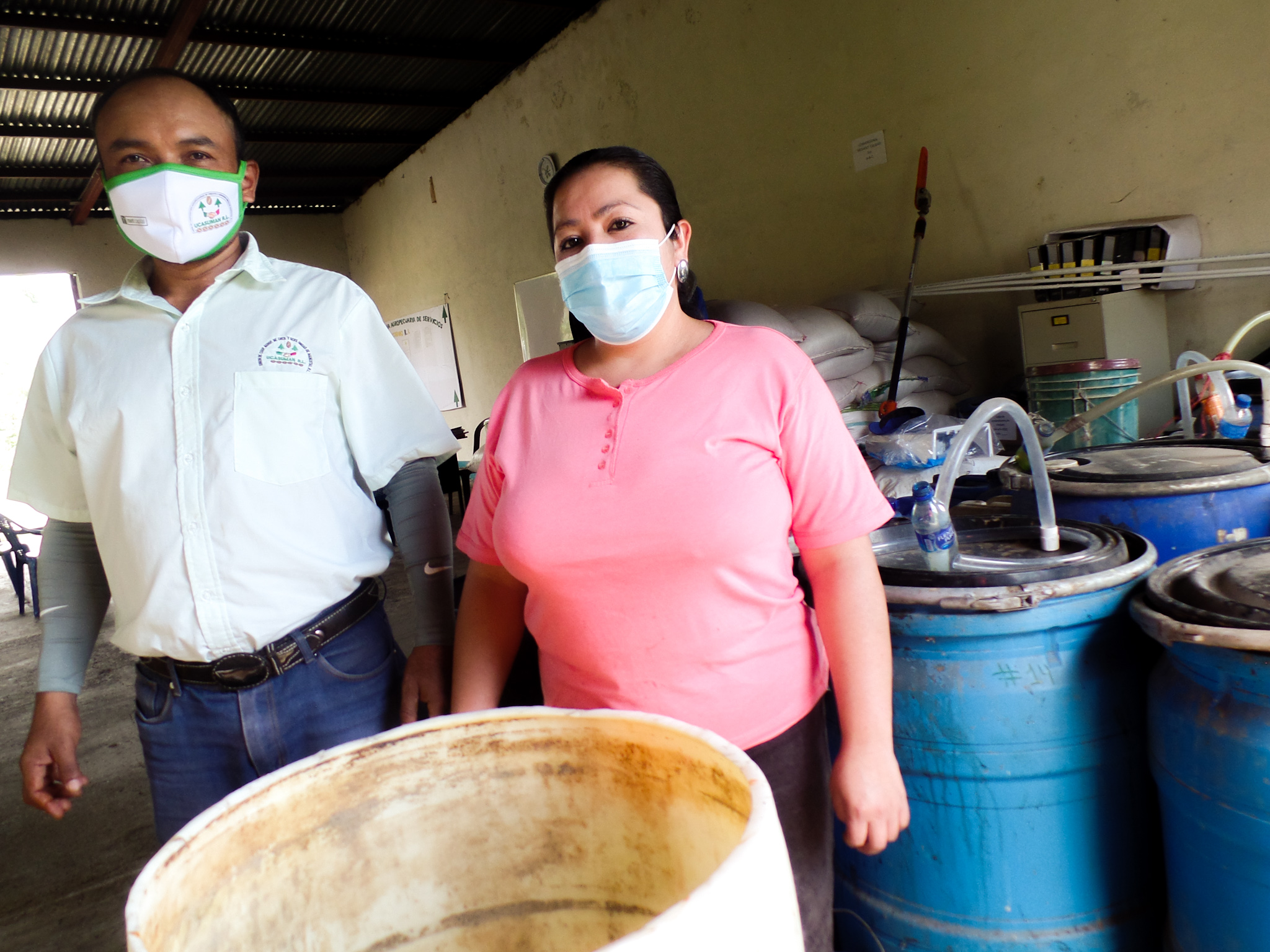As part of a training and experience-sharing process developed together with specialists of the PROCAGICA program, cooperatives and producers in El Salvador built up their capacities.

El Cuá, Nicaragua, 11 December 2020 (IICA) – As if it were a magic potion, a combination of minerals is transformed into biofertilizers that improve the nutrition of coffee plants. This safe, low-cost product is produced by cooperatives in Nicaragua and used by their members.
Copper sulfate, potassium sulfate, magnesium sulfate, ammonium dihydrogen phosphate and five other minerals are used in the biofermentation process, separately and in different barrels, to prepare Chelated Foliar Fertilizers (CFF).
The process to prepare these fertilizers is quite new in Nicaragua and has yielded excellent results. The use of this type of fertilizer is being promoted among coffee farmers in the northern region of the country by the Central American Program for Integrated Coffee Rust Management (PROCAGICA), as part of a joint effort between the European Union and the Inter-American Institute for Cooperation on Agriculture (IICA), which promote the initiative.
“Cooperatives have a constant need to improve fertilization on their coffee plantations. Previously, biofertilizers were produced using a different method, always by hand. But when we started working with PROCAGICA, they proposed setting up a chelate or mineral factory”, stated Juan Heradio Torres Pérez, treasurer of the board of directors of the San Isidro cooperative, in El Cuá, Jinotega, and one of the producers trained by the program to produce chelates.
Rafaela del Carmen González Ferrer, secretary of the cooperative’s education committee, recalled how surprised she was by the process. “I’ve been involved since the training sessions began. Seeing and hearing that you have to do everything separately, when you are used to putting it all together in a single container, makes you think that it will be difficult. But getting used to doing things differently is actually more difficult than learning how to do it”.
Efforts to create and strengthen these capacities among cooperatives and producers were part of a training and experience-sharing process developed together with specialists of the PROCAGICA program in El Salvador, who provided the initial training to set up Local Biofertilizer Production Units in two Nicaraguan coffee farmer cooperatives, in the cities of Jinotega and Jalapa.
These units provide coffee farmers with access to this low-cost biofertilizer, which they are able to purchase through funding provided as part of the revolving fund administered by each association.
At present, ten cooperatives already have Local Biofertilizer Production Units. Two more are expected to be installed next year. “The fertilizer was produced for the first time in July 2019; since then, the cooperative has produced the fertilizer on five other occasions—ten barrels the first four times, and 20 barrels during the most recent manufacturing process, on 28 July of this year. That is, two barrels for each element. We have been growing”, stated Rafaela.
According to Juan Heradio, the chelated fertilizers have yielded remarkable results. “When we first began applying the fertilizer, we were doubtful that it would work—we didn’t know what to expect. But the reality is that it works very well. We have achieved good results in the coffee plantations where we have continuously applied the mineral or biofertilizer”.
The program provided each member of the participating cooperatives with 20 liters of the solution developed during the training workshop. By gaining access to this resource, each producer would be able to validate the results of the bioinput and decide whether or not to use it in the coffee plot, based on his or her own experience.
“A producer says he must apply the fertilizer soon because he has a plot of coffee. He asks the cooperative for funding to purchase 20 liters, and the funding is granted. This is part of a revolving fund that is managed in a separate account, set aside exclusively for bioinputs”, stated Juan Heradio regarding the manner in which the cooperative executes the fund, which is paid off by producers at the end of the harvest.
“To apply foliar fertilizers, most producers rely on what they hear on the radio about regular products, which contain few elements and are totally synthetic; they may contain high quantities of a single element, but only two or three elements at most. This biofertilizer, on the other hand, is more balanced because it contains more than 10 concentrates. I believe that all of our members should apply this concentrate year-round”, concluded Mrs. Rafaela and Mr. Juan Heradio in unison, with great enthusiasm for a project whose positive growth they have witnessed since its inception.
More information:
Institutional Communication Division
comunicacion.institucional@iica.int











